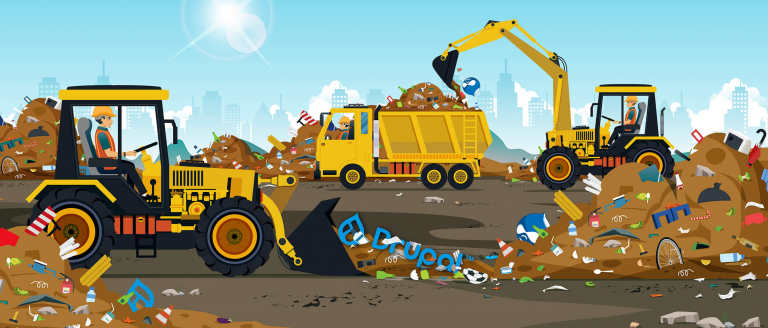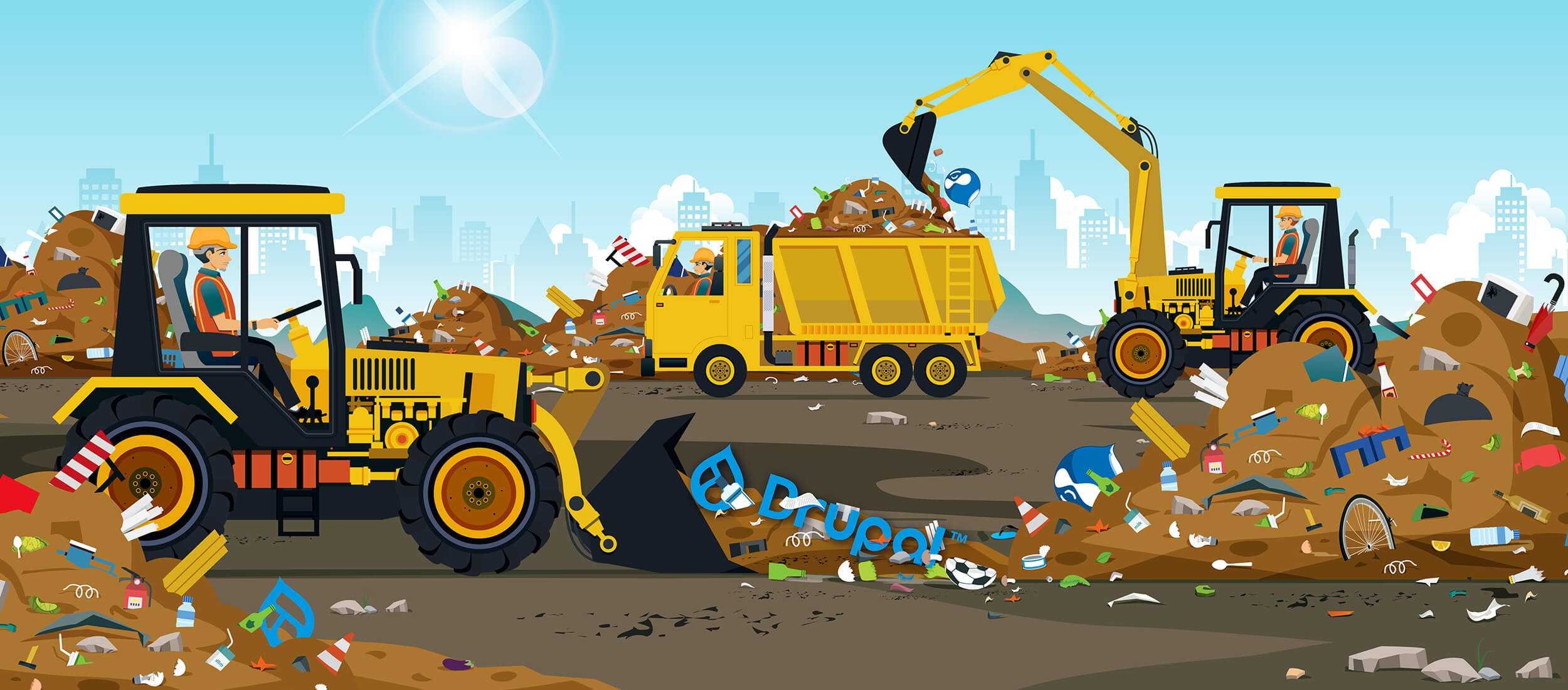At Tragic we are always looking for the next phase of technology growth, and always aim to provide our clients with the best long-term solution possible, no matter what problem we are solving. We try to keep our clients on the cutting-edge of stable new technology.
When we see a shift in technology, or a better solution available, we do a hard stop with our prior solution. We did this with Magento, Wordpress, non-cloud hosting, and now we are adding Drupal to the list.
Our relationship with Drupal dates back to 2008, and while there were some good times and beautiful site builds, we have witnessed the painful downward trajectory of the platform. Recently, we discussed the Tragic Demise of Drupal on our Youtube Channel. Though Tragic Media will support existing Drupal clients, we won’t be building any new solutions with Drupal. Let’s talk about why the Drupal CMS has failed developers and what we suggest as an alternative.
Monolithic CMSs are outdated
Drupal is a monolithic CMS, an all-in-one solution that allows you save, manage, and publish content to a website. We’ve talked about the drawbacks of monolithic CMSs and why headless architecture is better for performance, security, and scalability.
Businesses expect new software to be easy
The rise of SaaS has changed the expectations of business owners. No business wants to pay for expensive custom software or websites, unless there is a big benefit. Small businesses would rather use easy solutions like Wix or Squarespace, and larger businesses are adopting the benefits of a decoupled content platform. Wordpress seems to be the one exception, but that is because of the massive growth of its 3rd party plugin/theme solutions. Once again, making building and managing a website easier and cheaper.
Drupal does not support its developer community
The platform’s community is composed of 10,000 developers and over a thousand companies every year that contribute code. It’s no question that Drupal’s success is largely due to its developer community, but developers no longer want to work for free. Drupal offers little value to its community beyond DrupalCons.
Numerous software-as-a-service (SaaS) platforms like Canva, Shopify, and Gumroad are creating ways for developers to monetize their work. Even Wordpress has managed to create a paid plugin community so that creators are compensated for increasing functionality for other users.
Drupal, on the other hand, offers only unpaid support, overloaded issue queues, and little to no positive visibility of your work.
Drupal’s upgrade paths have been painful
Drupal’s upgrade paths have been frustrating to say the least. Rewrites of the core system and abrupt end-of-life (EOL) dates have jeopardized the security of their sites.
Drupal reached its peak with Drupal 7 (D7), and it is still the most popular version. D7 was powerful and offered developers the tools to build and scale new sites quickly. While there was a bit of a learning curve, it proved worth it and was a popular solution for solo developers and large teams alike.
With Drupal 8 (D8), there were drastic changes that completely redesigned the CMS codebase, causing a lot of headaches with migration from D7. D8 contained the most changes out of any Drupal release, and now, it is already approaching its end-of-life (EOL).
Drupal 9 tried to consolidate the community onto one platform to allow for more rapid iterations in the future. In order to keep your D8 site secure, you must upgrade from D8 to Drupal 9 (D9) before November 2021. Drupal 7 was also originally included in this November deadline, but after backlash from the community it has been extended another year. We experienced first hand the horribly painful process of upgrading a complex Drupal 7 site to Drupal 9, and we were left wondering what we actually gained from all of the effort we put in.
Building with Drupal 9 is slower, not faster
As developers and site builders, we expect tech platforms to be progressing forward faster. Existing systems should become faster, more intuitive, and easier to use. While there are sometimes a few steps back, it is only to leap substantially forward. Drupal 9 continues the trend of Drupal 8, which has made building new websites and applications slower and more complicated. While the sites themselves might be slightly faster in Drupal 9, that benefit is vastly outweighed by the extra time and resources required to complete a new project build.
“In simple terms we think Drupal is too slow to develop with, too hard to use and maintain, and costs too much as a result.” -Torchbox
What we recommend instead
Since 2017, the Tragic team has been a huge proponent of decoupled website development. There are huge benefits to performance, security, and maintenance, so that you can be more productive and strategic about your budget. Instead of dealing with the constant support and security patches of the back-end system, businesses can focus on creating a unique experience and building new features of their site.
As mentioned previously, we will continue to support Drupal clients, but we are no longer building new solutions with Drupal. Upgrading to a serverless CMS is a great way to offload security, performance, and expenses to a 3rd party. The Tragic Media team has seen great success with serverless or SaaS CMSs, like Contentful.
If you think it’s time to upgrade to a serverless CMS or want to know more about alternatives to Drupal, contact the Tragic Media team for a consultation!

